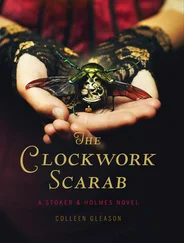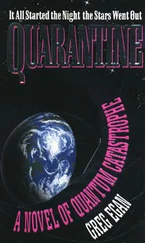Greg Egan - The Clockwork Rocket
Здесь есть возможность читать онлайн «Greg Egan - The Clockwork Rocket» весь текст электронной книги совершенно бесплатно (целиком полную версию без сокращений). В некоторых случаях можно слушать аудио, скачать через торрент в формате fb2 и присутствует краткое содержание. Жанр: Фантастика и фэнтези, на английском языке. Описание произведения, (предисловие) а так же отзывы посетителей доступны на портале библиотеки ЛибКат.
- Название:The Clockwork Rocket
- Автор:
- Жанр:
- Год:неизвестен
- ISBN:нет данных
- Рейтинг книги:3 / 5. Голосов: 1
-
Избранное:Добавить в избранное
- Отзывы:
-
Ваша оценка:
- 60
- 1
- 2
- 3
- 4
- 5
The Clockwork Rocket: краткое содержание, описание и аннотация
Предлагаем к чтению аннотацию, описание, краткое содержание или предисловие (зависит от того, что написал сам автор книги «The Clockwork Rocket»). Если вы не нашли необходимую информацию о книге — напишите в комментариях, мы постараемся отыскать её.
The Clockwork Rocket — читать онлайн бесплатно полную книгу (весь текст) целиком
Ниже представлен текст книги, разбитый по страницам. Система сохранения места последней прочитанной страницы, позволяет с удобством читать онлайн бесплатно книгу «The Clockwork Rocket», без необходимости каждый раз заново искать на чём Вы остановились. Поставьте закладку, и сможете в любой момент перейти на страницу, на которой закончили чтение.
Интервал:
Закладка:
Tullia believed that there had once been a giant, primal world, with every planet, every star, a fragment left behind by its destruction. Yalda wasn’t so sure; the gravitational pull of so much concentrated matter would have been stupendous. It was hard to believe that even a wildfire in some massive seam of sunstone piercing the depths of that ur-planet could have fractured it into rubble and scattered the resulting worlds across the void. Then again, maybe sunstone was nothing compared to the rocks that had blazed in the past. To expect the scatterer of worlds to be stable enough to persist to this day, to be recognized and studied, might be as naïve as hoping to meet your own mother.
By mid-afternoon Yalda was growing weary. When she’d first set out, the path’s steep gradient had felt like a promise of rapid progress: the faster she was ascending toward her destination, the better. Now the lack of respite from the endless climb simply made her angry.
Only stubbornness kept her going, and it kept her going too long. When she was forced to stop, retching and shaking, she finally understood what she’d done to herself. She’d brushed the symptoms aside, treating them as ordinary signs of fatigue and telling herself that she could overcome them with sufficient resolve.
Cursing her stupidity, she lay on the path, trying to cool herself against the uneven slabs of fractured rock, too weak and queasy to go looking for a proper bed of soil. She could feel the heat moving through her flesh, a stinging presence probing for an exit like a swarm of trapped parasites. The thought of dying here embarrassed her; she’d been told what to do, she had no excuses. Triumphantly pointing to her dissected corpse, Ludovico would ban all women from using the observatory. “Look at the size of this bloated creature! With a ratio of surface area to mass less than half that of a man, how could she be expected to survive the rigors of altitude?”
When night fell, Yalda tried climbing to her feet; on the third attempt she succeeded. She was still nauseous and trembling. She took a trowel from the cart and stepped off the path; there was no bare soil, but there was a patch of shrubs that she believed she could uproot. In good health she could have done it with her fingers alone, but the flesh she extruded now to follow the roots down was too weak to dislodge them. She hacked at the plants with the trowel, severing enough of the woody cores to free a shallow layer of soil. She lay in it and rolled back and forth, crushing worms and scraping her skin on broken roots, trying to maximize her area of contact.
Some time later she found herself lucid again, gazing up at the stars through a gap in the trees. Fragments of hallucinations lingered; she remembered thinking that she was already in the observatory, adjusting her equipment and wondering why the colors in the star trails were refusing to merge. She’d thought the glowing blossoms above her were flaws in the optics, surfaces chipped in the bumpy truck ride scattering stray light everywhere.
Contemplating the flowers’ cool radiance, Yalda wondered why nature hadn’t stumbled on some easier way to rid her body of its heat. Why couldn’t thermal energy simply be converted into light and tossed into the sky? Plants were believed to turn the chemical energy they extracted from the soil into light, a small amount of heat, and a new, more accessible store of chemical energy in their seeds and other structures. Animals, burning that secondary fuel, used the energy to move their muscles and repair their bodies, and to make a little light for internal signaling—but the rest became a wasteful, burdensome dose of heat. Why couldn’t they shift more of it into light, instead? Why had her grandfather’s glowing skin signified a fatal pathology, when every living thing would surely have had an easier time if it could shine like a flower?
Yalda clambered to her feet and returned to the path. Her mind was still a little askew; she found it odd that the cart had sat there for so long, undisturbed. By now, shouldn’t someone have chanced upon it and come looking for its owner—or failing that, ransacked it for valuables?
Well, no.
She took a loaf from the cart, sat on the ground, and ate half of it; at that point her body indicated abruptly that it had had enough. She rested for a lapse or two to make peace with the meal, then she set out again, moving slowly, vigilant for warning signs.
The sun was setting over the plains below, complicating the dusty brown channels with shadows, as Yalda approached the observatory. Renato was sitting outside; he’d not known exactly who’d be coming to replace him, but he’d known the schedule, and Yalda was late.
She couldn’t help calling out a greeting to him, though even to her the words sounded muffled and distorted, and she’d been told that her speech would be inaudible to any intended recipient. As she drew nearer, she saw the words on his chest: What took you so long?
Too much stopping to admire the view, she replied.
I’ll need to show you everything tonight.Renato waited for her to acknowledge that she’d read this, then he replaced it with: I have to leave in the morning.Yalda doubted that Fosco would abandon Renato if he didn’t show up precisely when he was expected, but the delay was her fault, and it would be unfair to put any pressure on Renato to rush his descent.
Renato showed her the living quarters first. There was a pantry, which she’d replenish from the cart, an inside bed—which she had to admit would be easier to keep free of weeds—and a storeroom with lamps, fuel, and an assortment of tools. No toilet, Renato wrote. Sorry.
I’m a farm girl, Yalda replied.
The office was still well-stocked with paper and dye; Yalda had brought a little of both. She was used to doing all her scribbling and jotting and rough calculations on her skin, saving paper for the final, polished results.
The telescope itself was not housed; the ten-stride-long box that held the heavy clearstone lens in place, its sides built of struts and crossbeams, had only a few skinny, strategically placed boards to block scattered light from entering the optics. The machinery that drove the mount, and the observer’s station, sat inside a kind of swiveling hut at the instrument’s base.
They entered the hut. In the dwindling light, Renato pointed out a printed maintenance schedule; Yalda replied that she’d read a copy back in Zeugma. Tullia had already told her most of what she’d need to know, though it was something else to have the tracking drive right in front of her, with its terrifying plethora of mirrorstone cogs and springs. The prospect of having to repair it if it broke seemed about as daunting as trying to bring one of Daria’s mutilated arborines back to life.
There were no lamps in the hut, but Renato moved about confidently, and apparently he could still read Yalda’s skin; maybe all astronomers ended up with eyesight like Tullia’s. When an indistinct gray smudge appeared on his chest, Yalda tentatively gestured that she’d need to touch him, and he spread his arms, granting permission. She moved her palm quickly over his body. Let’s see you line up a star and follow it, he’d written. I’ll feel better about leaving if you know what you’re doing.
Yalda had used a much smaller telescope at the university, but the principles were the same. Standing by the observer’s bench, she checked the clock by touch. Sitha would be high above the horizon; she had memorized its celestial coordinates, and she scribbled the conversion to altitude and azimuth for two separate times: the coming chime, and the one after. She cranked the telescope to point to the first location; it was well balanced and surprisingly easy to move, but there was something surreal about the walls of the hut turning on their rails as she labored against the azimuth wheel. Then she calculated the changes in the two angles that the star’s location would undergo between the successive chimes, and set them into the tracking drive.
Читать дальшеИнтервал:
Закладка:
Похожие книги на «The Clockwork Rocket»
Представляем Вашему вниманию похожие книги на «The Clockwork Rocket» списком для выбора. Мы отобрали схожую по названию и смыслу литературу в надежде предоставить читателям больше вариантов отыскать новые, интересные, ещё непрочитанные произведения.
Обсуждение, отзывы о книге «The Clockwork Rocket» и просто собственные мнения читателей. Оставьте ваши комментарии, напишите, что Вы думаете о произведении, его смысле или главных героях. Укажите что конкретно понравилось, а что нет, и почему Вы так считаете.










